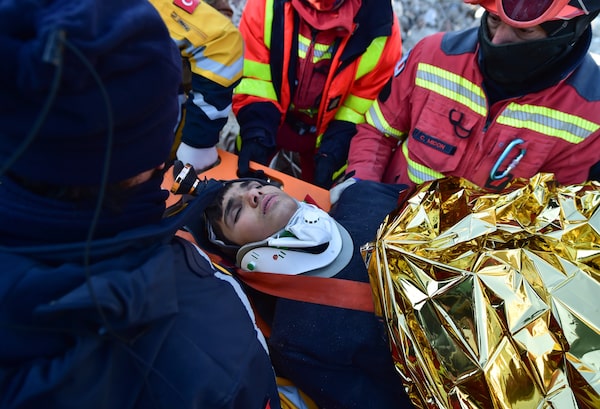
Rescue workers pull out Muhammed Enes Yeninar from the debris of a collapsed building in Kahramanmaras, southern on Feb. 14.Ismail Coskun/The Associated Press
Nine survivors were rescued from the rubble in Turkey on Tuesday, more than a week after a massive earthquake struck, as the focus of the aid effort shifted to helping people now struggling without shelter or enough food in the bitter cold.
The disaster, with a combined death toll in Turkey and neighbouring Syria exceeding 41,000, has ravaged cities in both countries, leaving many survivors homeless in near-freezing winter temperatures.
Turkish President Tayyip Erdogan has acknowledged problems in the initial response to the 7.8-magnitude quake that struck early on Feb. 6, but has said the situation is now under control.
“We are facing one of the greatest natural disasters not only in our country but also in the history of humanity,” Mr. Erdogan said in a televised speech in Ankara.
Those rescued on Tuesday included two brothers, aged 17 and 21, pulled from an apartment block in Kahramanmaras province, and a Syrian man and young woman in a leopard-print head scarf in Antakya rescued after more than 200 hours in the rubble. There could be further people alive still to find, said one rescuer.
But UN authorities have said the rescue phase is coming to a close, with the focus turning to shelter, food and schooling.
“People are suffering a lot. We applied to receive a tent, aid, or something, but up to now we didn’t receive anything,” said Hassan Saimoua, a refugee staying with his family in a playground in Turkey’s southeastern city of Gaziantep.
Mr. Saimoua and other Syrians who had found refuge in Gaziantep from the war at home but were made homeless by the quake used plastic sheets, blankets and cardboard to erect makeshift tents in the playground.
“The needs are huge, increasing by the hour,” said Hans Henri P. Kluge, the World Health Organization’s director for Europe. “Some 26 million people across both countries need humanitarian assistance.
“There are also growing concerns over emerging health issues linked to the cold weather, hygiene and sanitation, and the spread of infectious diseases – with vulnerable people especially at risk.”
At a Turkish field hospital in the southern city of Iskenderun, Indian Army Major Beena Tiwari said patients had initially arrived with physical injuries but that was changing.
“Now more of the patients are coming with post-traumatic stress disorder, following all the shock that they’ve gone through during the earthquake,” she said.
Families in both Turkey and Syria said they and their children were dealing with the psychological aftermath of the quake.
“Whenever he forgets, he hears a loud sound and then remembers again,” Hassan Moaz said of his nine-year-old in Aleppo, Syria. “When he’s sleeping at night and hears a sound, he wakes up and tells me: ‘Dad, aftershock!’”
A first convoy of UN aid entered rebel-held northwest Syria from Turkey via the newly-opened Bab al-Salam crossing.
Syrian President Bashar Assad agreed on Monday to allow UN aid to enter from Turkey via two more border crossings, marking a shift for Damascus which has long opposed cross-border aid deliveries to the rebel enclave.
Nearly nine million people in Syria were affected by the earthquake, the United Nations said, as it launched a US$400-million funding appeal.
The search for survivors was about to end in the north west of Syria, said the head of the White Helmets main rescue group, Raed al Saleh.
Russia also said it was wrapping up its search and rescue work in Turkey and Syria and preparing to withdraw.
The Turkish toll was 35,3418 killed, Mr. Erdogan said. More than 5,814 have died in Syria, according to a Reuters tally of reports from Syrian state media and a UN agency.
Survivors joined a mass exodus from earthquake-hit zones, leaving their homes and unsure if they can ever come back.
“It’s very hard … We will start from zero, without belongings, without a job,” said 22-year-old Hamza Bekry, a Syrian originally from Idlib who has lived in Antakya, in southern Turkey, for 12 years but prepared to follow his family to Isparta in southern Turkey.
More than 2.2 million people have left the worst-hit areas already, Mr. Erdogan said, and hundreds of thousands of buildings have become uninhabitable.
How you can help
Canadians who wish to support victims of the earthquake in Turkey and Syria must ensure any organization they are giving to is credible and has a solid track record in the work it advertises. Resources such as Charity Intelligence Canada can help with this. You can also check the Canada Revenue Agency to see whether its registration is up to date. Be aware that relief groups based abroad may not be able to issue you tax receipts for donations.
- White Helmets: Since 2018, this volunteer rescue group has helped Syrians through search-and-rescue operations, evacuations and medical care. www.whitehelmets.org
- Union of Medical Relief and Care Organizations: A French-based coalition of humanitarian groups that supports Syrian victims of war. www.uossm.org/donate_now
- Médecins sans frontières (Doctors Without Borders): This non-governmental organization had been in Syria before the quake and has mobilized more resources there. www.doctorswithoutborders.ca
- Islamic Relief Canada: A charity providing basic services to vulnerable people in disaster areas. www.islamicreliefcanada.org/emergencies/turkey-syria-earthquake-appeal/
- Molham: A non-profit relief group founded by Syrian university students in 2012. www.molhamteam.com/en/campaigns/439
- Oxfam Canada: This global anti-poverty organization is raising funds for humanitarian efforts in Turkey and Syria. www.oxfam.ca
- Save the Children: The Canadian branch of this international NGO is accepting donations for children and families in the disaster area. www.savethechildren.ca
- UNHCR: The United Nations refugee agency supports those fleeing the Syrian conflict with emergency supplies and medicine. www.unhcr.ca